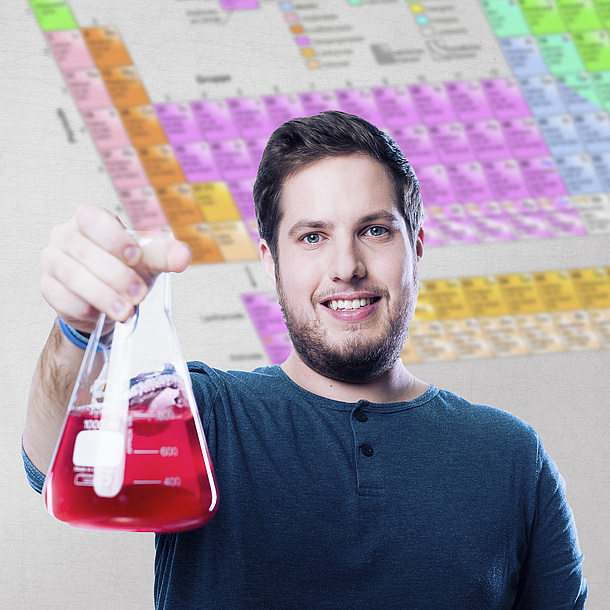- Duration of study: 6 semesters
- ECTS credit points: 180
- Academic degree: Bachelor of Science (BSc)
- Language of instruction: German
The Bachelor's Programme
In the bachelor's degree programme Chemistry, you will receive a sound basic education in the field of chemistry as well as a general introduction to fundamental scientific knowledge in physics and mathematics. This practical education also reveals the connections between these fields and other scientific disciplines, such as biology, biotechnology, medicine, chemical and process engineering and materials science.
Practical relevance plays an essential role in the degree programme. You will learn theoretical aspects of the field in lectures and apply what you have learned in practice in numerous laboratory courses. Students enjoy the great advantage of having access to teaching and research infrastructure at two universities and become familiar with the institutes and departments of chemistry in both institutions.
You have the opportunity to gain professional experience during your studies. As part of a free-choice subject (laboratory practice), you can carry out seasonal, chemistry-related work at a non-university institution (e.g. industry, research institution, public authorities). It is possible for students to get involved in research early on by working on research projects at the participating institutes of both universities. The project lab for the bachelor paper can be completed at any institute you choose.
Studying Chemistry
In this degree programme, you have the opportunity to specialise in the following areas:
Foundations of Science: You will receive a basic introduction to the fields of mathematics and physics. You need this knowledge to understand, work with, interpret and describe chemical processes.
Fundamentals of Chemistry: You will learn more about basic laws of chemistry, technical terms, connections in chemical reactions and how to interpret the periodic table. You will acquire practical skills, such as the use of measuring instruments.
Analytical Chemistry: You will deepen your knowledge in the area of analytical chemistry. This includes gaining knowledge of chemical equilibria, analytical methods and the evaluation of analytical data.
Inorganic Chemistry: Among other things, you will acquire knowledge of systematic inorganic chemistry and element properties based on their position in the periodic table. You will be given both theoretical and practical knowledge about how to handle chemicals and how to carry out chemical reactions.
Organic Chemistry: The subject provides you with knowledge of systematic organic chemistry, as well as the structures, bonds and properties of organic molecules and reaction mechanisms. You will also learn laboratory techniques and how organic compounds are synthesised.
Physical Chemistry: You will learn the theoretical and practical basics of physical chemistry in the fields of thermodynamics, kinetics, quantum chemistry and related scientific fields.
Biosciences: In this subject (encompassing biochemistry and biotechnology), you will explore the close connection between chemistry and the life sciences, i.e. life processes and biotechnological applications.
Chemical Technology: You will learn theoretical and practical aspects of inorganic or organic technologies, food technology and process engineering. In addition, you will learn about recycling, industrial environmental protection and environmental technology.
Indisciplinary Subjects: In this subject (encompassing molecular analysis and spectroscopy), you will learn different methods that you can use to characterise chemical compounds and materials. The sub-fields of electrochemistry and electroanalysis as well as macromolecular chemistry round off the basic chemical training.
What will I have to do in the first semesters? How much practice can I expect? And what can I actually do with my degree when I've finished? Check what you expect!
A student and a lecturer will take time for all your questions and you will get to know TU Graz during on-site appointments. Up to 10 persons can participate at each date.
Contact: lse@tugraz.at
Chemistry influences the structure of all the substances surrounding us. From pharmaceuticals to biofuels, chemistry is the foundation of many products that are used today.
At TU Graz, basic and applied research are conducted in the field of chemistry at an internationally recognised level. Focal areas include:
- molecular chemistry, bioactive substances, (food) sensor technology,
- new hybrid materials,
- materials related to smart energy, for example, in TU Graz's own battery research centre for materials.
Chemistry also plays a highly important role in industry, for example, in the pharmaceutical, electronics, battery, chemical, semiconductor, or biotechnology industry. In addition, chemists can apply their knowledge in the areas of patenting, the environmental and material sciences, as well as in the oil industry and biorefineries.
Admission
Requirements for admission to a bachelor's degree programme at TU Graz
Summer semester 2026
Admission period: 7 January to 5 February 2026
Winter semester 2026/27
Admission period: 6 July to 5 September 2026
Contact study@tugraz.at
Perspectives for Graduates
The Bachelor's Degree Programme in Chemistry provides a basic education that prepares you for a scientific career – in either research or teaching – in all areas of chemistry or technical chemistry.
Chemists work, for example, in industry or medium-sized businesses, the public administration, or science communication. Several aspects of chemistry are relevant, such as analytical and synthetic chemistry, technical chemistry, materials science, bio- and natural products chemistry, chemical and process engineering, environmental and food chemistry, or patenting.
Graduates of this programme have a firm foundation that allows them to apply for further master's degree programmes in the fields of chemistry and technical chemistry, as well as related fields such as materials science, biochemistry, natural products chemistry, chemical engineering, environmental and food chemistry.
After completing the bachelor's degree programme, you can enrol in the following master’s degree programmes without further requirements:
- Advanced Materials Science
- Chemical and Pharmaceutical Engineering
- Chemistry
- Green Process Engineering
- Technical Chemistry
Information on other master's degree programmes with requirements you can find on the respective pages for the master’s degree programmes.
In addition, the bachelor's degree offers you the opportunity to apply internationally for master's degree programmes.





